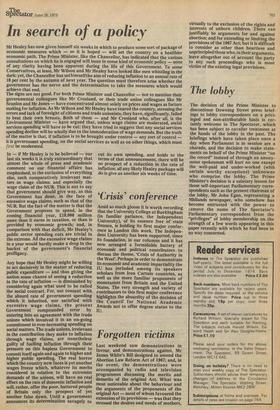In search of a policy
Mr Healey has now given himself six weeks in which to produce some sort of package of economic measures which — so it is hoped — will set the country on a healthier economic path. The Prime Minister, like the Chancellor, has indicated that the various consultations on which he is engaged will issue in some kind of economic policy — none of any clarity having been apparent during the life of this Government. To some Conservatives, at least, Mr Wilson and Mr Healey have looked like men whistling in the dark: yet, the Chancellor has set himself the aim of reducing inflation to an annual rate of 10 per cent by the autumn of next year. The question must therefore arise whether the government has the nerve and the determination to take the measures which would achieve that end.
The signs are not good. For both Prime Minister and Chancellor — not to mention their governmental colleagues like Mr Crosland, or their trade union colleagues like Mr Scanlon and Mr Jones — have concentrated almost solely on prices and wages as factors making for inflation. As Mr Wilson and Mr Healey have toured the country, stressing the errors and lack of foresight of citizens and trade unionists, they have, significantly, failed to beat their own breasts. Both of them — and Mr Crosland who, after all, is the Environment Minister — have argued that, unless wage claims are moderated, social services spending will have to be cut: they have tried to suggest that any social services spending decline will be wholly due to the immoderation of wage demands. But the truth of the matter is that, if inflation is to be brought under control — any sort of control — it is government spending, on the social services as well as on other things, which must first be moderated.
In — if Mr Healey is to be believed — our last six weeks it is truly extraordinary that almost the whole of press and academic comment on our financial affairs has emphasised, to the exclusion of everything else, such comparatively irrelevant matters as wage claims; and especially the wage claim of the NUR. This is not to say that government should give way, as this Government has done, in the face of excessive wage claims, such as that of the NUR. But the fact of the matter is that the Government proposes to spend, in the coming financial year, £10,000 million more than it earns in taxation, or than is provided by economic growth; and, in comparison with that deficit, Mr Healey's public sector spending cuts are trivial in the extreme. All the excessive wage claims in a year would hardly make a drop in the bucket of the government's financial profligacy.
Any hope that Mr Healey might be willing to act decisively in the matter of reducing public expenditure — and thus giving the nation some chance of seeing a reduction in the rate of inflation — is diminished by considering again what used to be called the social contract. For, not content with the absurd rate of government spending which it inherited, nor satisfied with excessive wage claims, the present Government compounded error by entering into an agreement with the trade unions which involved it in an on-going commitment to ever-increasing spending on social matters. The trade unions, irrelevant in the contribution they make to inflation through wage claims, are nonetheless guilty of fuelling inflation through their pressure on this hapless Government to commit itself again and again to higher and higher public spending. The real horror which the country now faces is yet another wages freeze which, whatever its merits considered in relation to the extremist demands of the unions, will have no real effect on the rate of domestic inflation and will, rather, offer the poor, battered people of Britain only the prospect of yet another false dawn. Until a government announces its determination savagely to cut its own spending, and holds to the terms of that announcement, there will be no prospect of a reduction in the rate of inflation: all any likely Healey package will do is give us another six weeks of time.


































 Previous page
Previous page